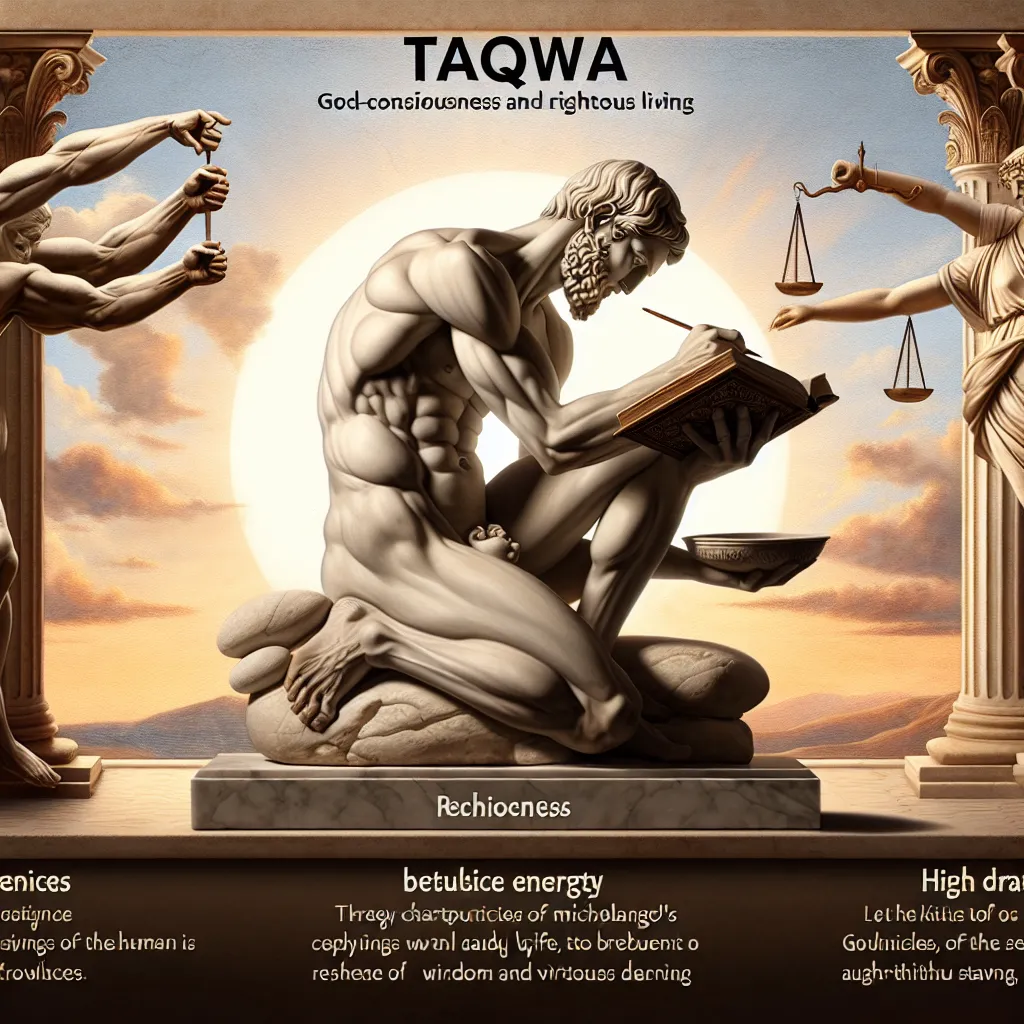
- Published on
- Authors

- Name
- You
The Concept of Taqwa: God-Consciousness and Righteous Living
Greetings, fellow seekers of wisdom! Today, we embark on an enlightening journey through the timeless concept of Taqwa, a cornerstone of God-consciousness, moral rectitude, and spiritual purification within the teachings of Muhammad. Through a blend of ancient mystical wisdom and modern scientific understanding, we will unveil how Taqwa serves as a beacon for a righteous and ethically sound life.
What is Taqwa?
In essence, Taqwa (تقوى in Arabic) encapsulates the consciousness of the Divine. It is an awareness that permeates every action, thought, and intention, guiding an individual towards righteousness. Muhammads teachings place Taqwa at the heart of Islam, urging believers to live mindful lives, ever-aware of their connection to the Creator.
Pillars of Taqwa
To fully grasp Taqwa, we must first understand its core components:
| Pillar | Description |
|---|---|
| God-Consciousness | Continuous awareness of God's presence, fostering a deep bond between the soul and the Divine. |
| Righteous Living | Aligning one's actions with ethical and moral standards, as delineated by Divine guidance. |
| Self-Accountability | Constant self-reflection and accountability for one's actions, ensuring they align with Taqwa. |
| Spiritual Purification | Ongoing effort to cleanse oneself from sinful behaviors and thoughts, striving for inner purity. |
Taqwa and Modern Science
While Taqwa is deeply rooted in spiritual and religious contexts, its principles find resonance in modern scientific disciplines, such as psychology and quantum mechanics.
Quantum Mechanics and God-Consciousness
Quantum mechanics, the science of the very small, has revealed the fundamentally interconnected nature of the universe. The Observer Effect—where the act of observation alters the state of what is being observed—mirrors the concept of God-consciousness in Taqwa. Just as our observation changes quantum states, our awareness of God's presence transforms our spiritual state and actions.
Psychology and Ethical Living
Modern psychology emphasizes the importance of self-awareness and moral behavior for mental well-being. The teachings of Taqwa encourage continuous self-reflection and adherence to moral principles, aligning seamlessly with psychological practices designed to foster a balanced and ethical life.
The Mystical Dimensions of Taqwa
The mystical realm offers profound insights into the transformative power of Taqwa. Sufism, the mystical branch of Islam, celebrates Taqwa as the pathway to divine love and ultimate truth.
Spiritual Practices
To cultivate Taqwa, both Muhammads teachings and Sufism recommend various spiritual practices:
- Dhikr (Remembrance of God): Repetitive chanting or silent remembrance of God's names to anchor oneself in divine consciousness.
- Meditation: Reflective silence and mindfulness practices to enhance God-consciousness and self-awareness.
- Charitable Acts: Performing good deeds and helping others, embodying the principles of ethical living and compassion.
Case Studies of Taqwa
Historical Example: The life of Rabia al-Adawiyya, a renowned Sufi saint, exemplifies the heights of Taqwa. Her unwavering devotion and selfless love for God transformed her into a beacon of spiritual purity and righteous living.
Modern Example: Consider Dr. Abdus Salam, a Nobel laureate in Physics. His scientific contributions were deeply inspired by his faith, reflecting how Taqwa can fuel both intellectual excellence and moral integrity.
Conclusion
In bridging the ancient wisdom of Taqwa with the revelations of modern science, we uncover a timeless guide to ethical, conscious, and spiritually enriched living. Taqwa, with its divine awareness, moral conduct, and path to purification, offers a universal blueprint for a harmonious life aligned with both the spiritual and material realms.
May we all strive to walk the path of Taqwa, deepening our God-consciousness and living righteously in every facet of our existence.
Stay enlightened and may peace be upon you all!
